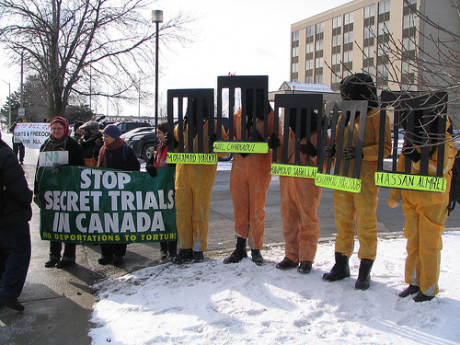News
You are here
Trudeau Liberals fail to defend civil liberties

August 23, 2016
In May, a Federal Court Justice ruled the National Security Certificate against Mahmoud Jaballah to be unreasonable, almost 20 years to the day that he and his family arrived in Canada seeking asylum as refugees from Egypt’s Mubarak dictatorship.
But in August, it was announced that the Trudeau government – touted as a supposed friend to refugees because it admitted 25,000 Syrians into Canada – is appealing the Jaballah decision.
Security Certificates allow for secret trials where information is not disclosed to the detainee or to their lawyer, unlike a criminal trial in which there must be full disclosure and due process. Instead, it sets up a process that uses the lowest standard of proof of any court in Canada. Security Certificates allow imprisonment and deportation of refugees and permanent residents to unjust imprisonment, torture or even death. They have only been used against Muslims, none of whom were ever charged with any crime.
One of them is Mahmoud Jaballah, who the government alleges is a member of al-Jihad, a group which advocates violence against the Egyptian government. Jaballah denies this accusation; he sought refugee status on the basis that he was wanted by Egyptian authorities on charges of inciting violence, and that he would be killed if sent back.
In May, Federal Court Justice Dolores Hansen ruled that the government had not in fact established reasonable grounds to believe that Jaballah is a danger to Canadian security. She also rejected the assertion he was ever a member of al-Jihad or provided support to the group, and ruled to strike down the Security Certificate against Jaballah. But the federal government is claiming that Justice Hansen made mistakes in concluding there was no credible evidence he posed a threat to Canada. In a notice filed with the Federal Court of Appeal, the government asks that the ruling be overturned and the Security Certificate be upheld, failing which the case should be sent back to the Federal Court for another look.
In an approach that signals no departure from the Harper government’s approach to Canadian “security” and civil liberties, federal lawyers claim that Justice Hansen relied on a higher standard of proof than necessary in weighing the evidence. Again, Security Certificates have been widely condemned precisely for relying on the lowest standard of proof in Canada.
The Liberal appeal was filed during the immediate aftermath of Aaron Driver, an Ontario man with Islamist sympathies who was killed in August during a confrontation with police. There can be no doubt that the Liberals are trying to demonstrate that they are not “soft” on terror.
The appeal also comes in tandem with the federal government’s new “anti-radicalization” initiative. While the program has received endorsement from some in the Muslim community, this only continues a process whereby Canadian Muslims are constantly expected to visibly demonstrate their opposition to terrorism and “radicalization” in order to have credibility in raising concerns over civil liberties and Islamophobia.
But no “anti-radicalization” campaign can take the place of halting what fundamentally fuels political disaffection and the use of terrorism as a strategy: the Western drive to imperialist war in the Middle East. The first promise made, and the first broken, by Trudeau after his election was to stop Canadian involvement in the bombing of Syria and Iraq. It is this aggression in the name of combating ISIS and other Islamist groups that feeds their growth and growth in the ranks of their sympathizers.
It is not Mahmoud Jaballah, or any of the other victims of Security Certificates, who pose a danger to national security. It is Canada’s involvement in the war on Iraq and Syria that makes ordinary people in Canada unsafe.
Section:
Topics:









